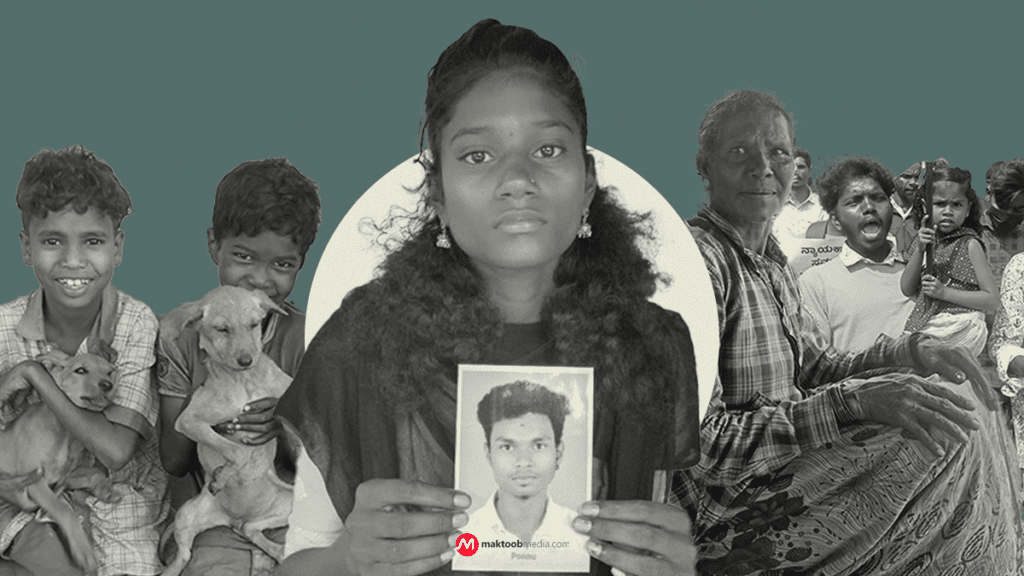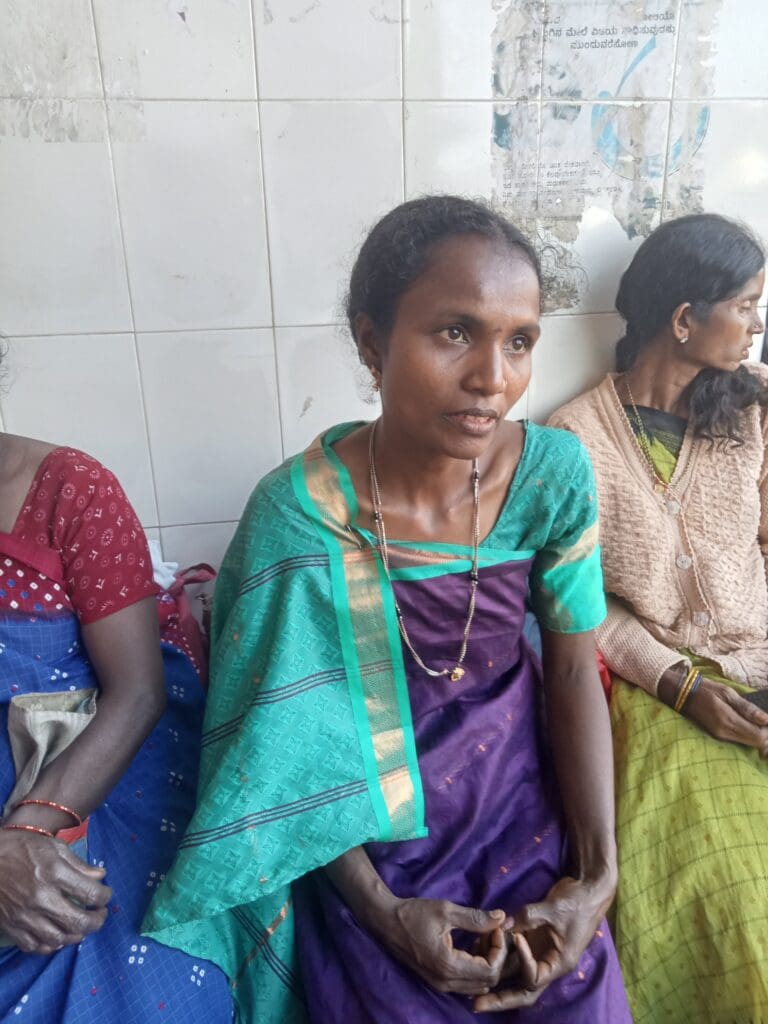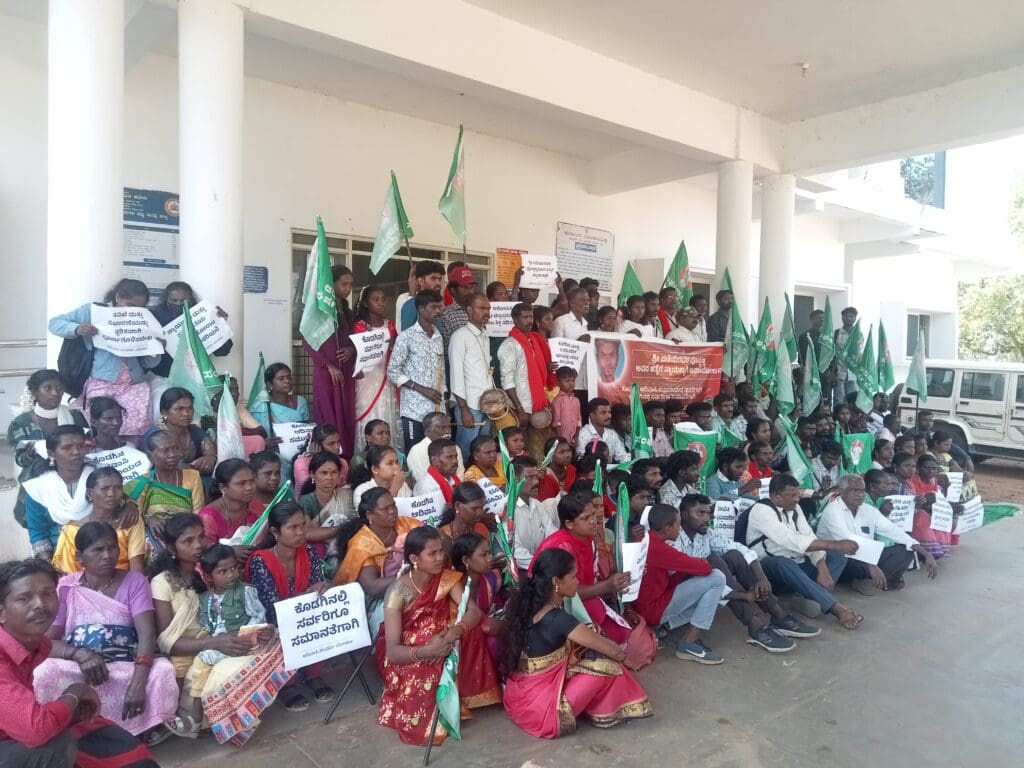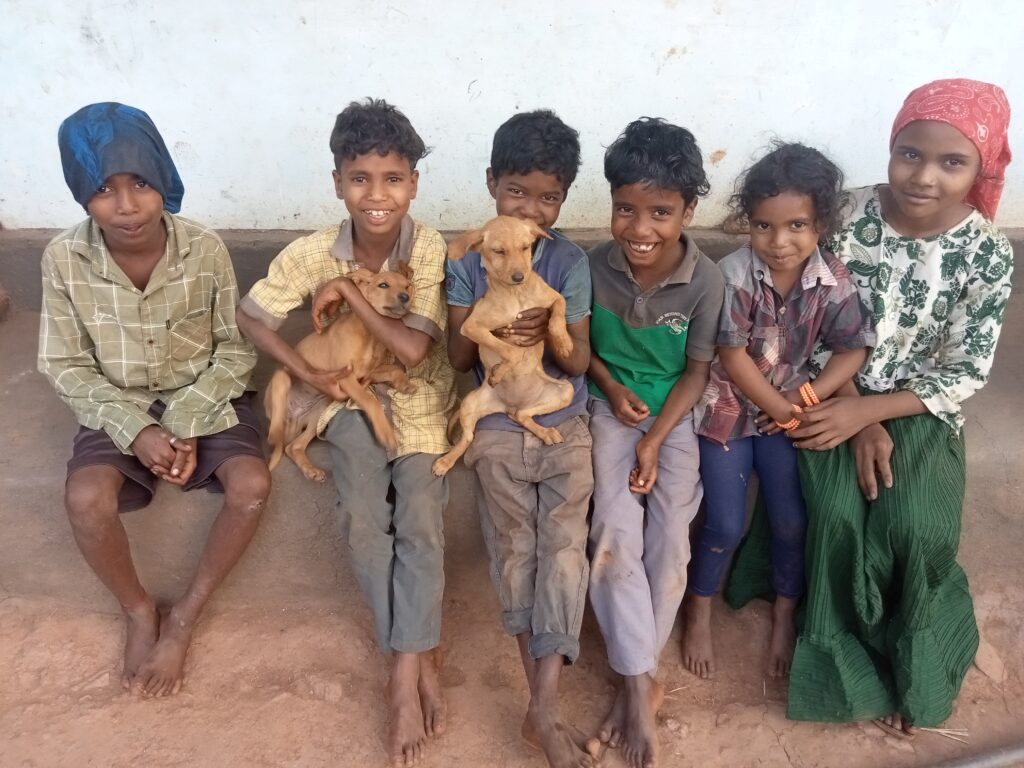
16-year-old Geetha, a plantation labourer from the Paniya Yerava Adivasi community in Kodagu, is still grieving the loss of her husband, Paniyeravara Ponnanna. 18-year-old Ponnanna, also a Paniya Yerava Adivasi and coffee plantation worker, was shot dead on 27 December 2024 in Chembebellur village of Virajpet Taluk by Porukonda Chinnappa, a Kodava, while plucking jackfruit.
Kodagu, a southwestern district in Karnataka, is known for its coffee plantations, which are primarily owned by the Kodavas, the region’s socially, politically, and economically dominant community.
Fifty-seven-year-old Porukonda Chinnappa, an ex-serviceman working as a guard at the State Bank of India in Virajpet, and the uncle of Ponnanna’s employer, hurled casteist abuses before shooting Ponnanna with his gun in front of Geetha.
A Class 8 dropout, Geetha, who had been married to Ponnanna in May 2023 at the age of 15, shared the harrowing ordeal.
“I craved jackfruit and asked Ponnanna for the same around 5:30 pm. He climbed the tree inside the plantation while I was on the phone with my mother. He asked me to keep a distance from the tree, citing safety.”
Seeing Ponnanna on the tree, Chinnappa, who came armed with his gun and dog, shouted, “Ponnu, you son of a Yerava bastard. You come to my farm and pluck jackfruits; I am going to kill you.”
“Chinnappa fired, and Ponnanna fell instantly. He fired again but hit the jackfruit. I ran to a crying Ponnanna, who begged to be taken to the hospital. By then, Chinnappa had left with his dog. I saw him shoot my husband dead.”
Ponnanna was taken to a hospital in Virajpet, where he was declared dead.
A complaint was filed on the same day by Geetha at Virajpet Rural Police Station, and Chinnappa, who is now in jail, was arrested under Sections 103(1) (murder) of the Bharatiya Nyaya Sanhita, Section 3(2)(v) (offence against an SC/ST person) of the Scheduled Castes and Scheduled Tribes (Prevention of Atrocities) Act, and Sections 3 (carrying a firearm without a licence) and 25 (punishment for offences related to arms and ammunition) of the Indian Arms Act.
Ponnanna, a Class 9 dropout, was working for a mere ₹350 per day at the plantation owned by the Porukonda family. Ponnanna wasn’t called ‘Ponnu’ out of affection. Kodavas avoided calling him ‘Ponnanna’ as it was a Kodava name.
Geetha shared past instances of an attempted attack by Chinnappa, who let his dog loose on Ponnanna. “We were warned not to walk in front of their house and would get shot dead.”
The couple didn’t complain to their employer since Chinnappa was their uncle.
Geetha told Maktoob that Chinnappa should receive capital punishment. Expressing fear as the sole witness to the murder, she said, “If Chinnappa gets bail, something may happen to me.”
Ponnanna is survived by his 42-year-old father, Thammu, 37-year-old mother, Sumi, and 10-year-old brother.
Thammu, a plantation labourer, said that their demands include ₹20 lakh compensation for the family, a job for Geetha, a house for the family, and government support for the educational expenses of their youngest son.
Sumi, also a labourer, struggled to speak as her eyes filled with tears. She said, “Our son was supposed to take care of us when we grew old. The government should take the necessary legal action to support us and ensure the murderer is punished.”

oppo_32
On 15 January 2025, Geetha, Thammu, and Sumi, along with hundreds of Adivasi labourers led by the Adivasi Sangharsh Morcha, a feeder organisation of CPI (ML) Liberation, marched from Virajpet Clock Tower to the Taluk office to protest Ponnanna’s murder. They also highlighted the harsh living conditions of Adivasi labourers, who lack basic amenities, education, healthcare, and decent employment.
Virajpet Taluk Tahsildar Ramachandra Mathanadi assured them of justice. Venkat Raj, IAS, the district collector of Kodagu, told Maktoob that an atrocity case has been registered under the relevant act in connection with the murder case, and the social welfare department is actively following up on the matter.
Sekar, Social Welfare Department Deputy Director, told Maktoob that ₹8,25,000 has been sanctioned for Geetha and Ponnanna’s parents. Sekar said, “Already ₹4,12,500 has been deposited, a monthly pension of ₹6,431 has been granted for his mother, and a permanent job under Group D post will be given to Geetha once she attains 18 years.”

The dark history of Kodagu
CPI (ML) Liberation Kodagu district secretary Mohan, who is assisting the family, chuckled and said, “India may be independent, but the Paniya Yeravas are not. They are almost entirely dependent on the local landlords and coffee planters, particularly the Kodavas. Bonded labour and slavery are still here in Kodagu.” He emphasised, “The killing of Ponnanna is not only class violence but also caste violence against Paniya Adivasis by feudal plantation owners of Kodagu.”
Yeravas are Paniya Adivasis whose ancestors migrated from Wayanad in Kerala to Kodagu in search of work. The majority of Paniyas in South India, who also have their own language, inhabit Wayanad. ‘Pani’ means work, and ‘Paniya’ means labourers. Traditionally, they were agricultural labourers of upper-caste landlords. However, the Kodavas referred to Paniyas as Yeravas. In the Kodava language, the word ‘era’ means ‘beg’, giving the term Yerava a racist connotation—’beggar’—visibly reflecting historical discrimination.
In Wayanad, Paniyas were purchased as bonded labourers by landlords during the Valliyoorkavu temple festival until the late 1970s. Landlords would select labourers, make them work under inhumane conditions, and trade them to the next landlord the following year.
Mohan states that there is no true democracy in Kodagu for Adivasis; democracy exists only for the Kodavas, who trace their disputed lineage to superior genes. The Kodavas consider themselves a tribe instead of Hindus, though they are presently governed under Hindu laws. One of the demands of the Adivasis is regarding the disarmament of the Kodava community, who consider themselves a martial clan traditionally associated with swords, daggers, and guns.
Many Kodavas serve in the Indian Armed Forces, with their ancestors having served in the British Indian Army. Since 1861, this landowning community has been exempt from firearm licences, a privilege granted to “Coorg by race” individuals and native landholders. The Union government reaffirmed this exemption in 1963 under the Indian Arms Act, 1959. A petition challenging the caste-based exemption was filed in the Karnataka High Court.
In 2019, the Ministry of Home Affairs extended the provision until 31 October 2029. The Adivasis who spoke with Maktoob said that every Kodava household has at least one gun, with every family member being trained to use it.
Adivasi Sangharsh Morcha Kodagu district secretary and plantation labourer Gouri PM, a Paniya Adivasi, told Maktoob, “Adivasi plantation labourers are having a life of slaves in Kodagu. The Kodavas don’t want us to be educated. They confiscate our identity cards and Aadhaar and want us, including our children, to live as their slaves. Even if we wear good clothes, buy a bike, or use a phone, the Kodavas cannot tolerate it due to racism.”
Though the present generation of Paniya Adivasis attends school, many still drop out to work as plantation labourers.
Gouri, whose wages were ₹80 per day in 2016, claims that Adivasis who reacted even slightly against the Kodavas were taken away in their vehicles and physically assaulted. She also added that Adivasis were even caged along with dogs, who would bite them. Gouri also added that Adivasi girls are forced to do household work and that sexual violence is perpetrated by the Kodavas against girls and women. When asked why the atrocities go unreported, Gouri said, “Most workplace assaults and sexual harassment cases aren’t reported to the police because survivors fear the Kodavas, feel ashamed to complain, know the police are acquainted with Kodavas, and have no alternative job options.”
Gouri elaborated, “We are scared to react against Kodavas or report the atrocities to the outside world. They are armed and will retaliate. They won’t even let us walk on the road if we resist. If we talk in groups or if they find out about this interaction with a journalist like you, it might even endanger us.”
‘Our blood and sweat is your coffee’

Kodagu is the largest coffee-producing district in India. According to the district administration, coffee is grown on 1,06,921 hectares, covering 44% of Karnataka’s coffee area. Kodagu produces 1,10,730 MT of coffee annually, contributing 50% to the state and 35% to the country. As a labour-intensive crop, coffee cultivation generates 51% of employment in the district.
The coffee harvest season in Kodagu begins in November and lasts until March, requiring a large number of labourers for picking and processing cherries. During the off-season, which constitutes the majority of the year, labourers are tasked with weed control, pruning, planting, and fertilising.
Unlike the off-season, during the harvest season, wages are based on the kilograms of coffee cherries labourers pick, not the hours of work.
Twenty-five-year-old Savitha, Ponnanna’s cousin, told Maktoob that the cheap labour pool of Adivasis in Kodagu is filling the pockets of coffee plantation owners, while consumers remain unaware of the violence behind it.
“The coffee you are drinking is our sweat and blood,” said Savitha, who does not know that Kodagu is called the Scotland of India. Savitha highlighted the wage disparity, including differences based on gender.
“The wage per kilogram for contractual labourers varies from ₹5 to ₹7, depending on the employer. We are paid ₹7 per kilogram, and we pick almost 100 kilograms a day. But labourers living in line houses are paid less—they receive less than ₹5 per kilogram.”
“During the off-season, labourers living in line houses are paid between ₹200 and ₹350 per day. However, we, as contractual plantation labourers, earn more than ₹500,” she added.
She continued, “There is, however, a gender pay disparity—men are paid ₹600, while women receive only ₹500 for the same work. Even for line labourers, there is a deduction of ₹100 for women.”
“We want fixed wages during the harvest season as well because not every day yields enough kilograms to earn a decent amount, especially with the prices of basic commodities skyrocketing,” Savitha said.
Living in a line house, 23-year-old YA Manju, Geetha’s brother, who earns ₹400 per day, said that he buys his gumboots and gloves since the employer provides none. A Class 9 dropout, he has been working for five years and is unaware of his entitlements, including bonuses, allowances, and paid leave.
The plantation labourers are protected under the Karnataka Plantation Labour Act, which is an extension of the Plantations Labour Act, 1951. It is supposed to govern the welfare and working conditions of plantation workers.
When Madikeri Labour Officer Kaveri T told the reporter that she was not aware of unequal wages being paid on a gender basis, Labour Inspector Nikhil Chandra stated that the minimum wage fixed by the government for laborers, regardless of whether they live in line houses, is the same.
Nikhil added, “Any wages below the government-prescribed minimum wage of ₹426 constitute a violation of labor rights. However, unless the laborers submit a written complaint with evidence, no action can be taken against the employers.”
According to the Coorg Planters Association (CPA), a planters’ body in Kodagu with 800 members, the minimum wage for plantation workers is ₹451.22. This includes a basic wage of ₹425 and a variable dearness allowance of ₹26.22.
“The current minimum wage was decided after discussions between labour unions, coffee growers, and planters,” Velliappa, secretary of CPA, told Maktoob.
“No one will work for ₹350,” added Velliappa, who also stated that it is untrue that line laborers are paid less than the prescribed wages.
Dismissing CPA, HM Somappa, the Kodagu district president of the Communist Party of India (CPI)-affiliated All India Trade Union Congress (AITUC) and leader of the United Plantation Workers’ Union, acknowledged to Maktoob that labourers in line houses are paid less than the minimum wage, and bonus allowances, gratuity and provident fund and other benefits are not being provided.
Somappa, who was the CPI candidate for the 2023 assembly elections from the Madikeri constituency, said, “Labourers can’t survive on the wages provided by local planters. In contrast, private limited companies offer decent wages and better facilities for labourers.”
Landless, marginalised
To improve mental health and fearing for her safety, Geetha moved in with Gauri PM. Gauri’s family lives in Kedamallur, a village where 59 Adivasi plantation laborer families, including Savitha, who all formerly lived in line houses, live in sheds. The sheds in Kedamallur reflect the hardships of laborers who have been waiting for rehabilitation for eight years, despite government promises of permanent housing and land.
According to Gauri’s husband, Tholar, in 2017, 135 Adivasi families, supported by CPI(ML) Liberation, encroached on over 20 acres of land in Heggala and built sheds, demanding permanent rehabilitation. However, the police evicted them after five days, claiming the land was private. The families were then relocated to a government building in Thithimathi.
The government promised them land, but bureaucratic delays forced them back to their line houses. Days later, they returned to Heggala, only to be evicted again by the police on June 15, 2017, and moved to Kedamallur’s 7.5-acre vacant government land. Now allotted to ITDP, the promised houses remain unfinished.
The Adivasis cleared the hilly terrain, making it suitable for makeshift sheds. They faced threats from Kodavas, who protested against giving them land.
In Kedamullur, the government provided only six common Indian-style toilet cabins for 250 people. Five are unusable, leaving one for women, while men defecate in the open.
With no electricity connection provided by the government, each family was given two small solar panels that power one or two bulbs. During the rainy season, energy production drops, and the tarpaulin sheets get damaged by strong winds. The heat in the days is unbearable, making it difficult to stay inside.
“Politicians visit us during election campaigns, make promises, and then disappear, only to return with the same promises during the next election cycle,” criticised Tholar.
Savitha sees her generation as doomed. She said, “The government must end the exploitative ‘line housing’ system by providing land for housing and farming, along with access to healthcare, education, and jobs.”
Gouri added, “Laborers with independent homes can choose work and negotiate wages, unlike those in line houses, who remain bonded to employers.”
S. Honnegowda, Project Coordinator of ITDP, told the reporter that 129 houses will be built in Kedamullur for 59 families, and other laborers living in line houses will be relocated there.
He said, “Construction of 60 houses has already started. The delay in construction is due to technical reasons. It will be completed as soon as possible with electrification, sanitation, and water tanks.” He also added that the Chief Minister is aware of the general issues in Kedamullur. Commenting on the settlement, he stated that the people living in Kedamullur had forcibly settled there.
Differing with the usage of terms ‘forced settlement’ and ‘encroachment’, Adv. Clifton D’Rozario, Karnataka state secretary of CPI(ML) Liberation, told Maktoob, “All government land is people’s land. If people are not given what is due to people, they are going to take what is due to them”. He also highlighted the mass encroachment of government lands by dominant communities in Kodagu.
In February 2024, Virajpet MLA A.S. Ponnanna appealed to the government to sanction encroached land for small-scale coffee growers and provide land on lease to large coffee growers.
Last year, Madikeri Deputy Conservator of Forests Bhaskar told the media that a total of 3,410 forest encroachment cases, covering 5,551 acres, were pending in the courts.
In December 2024, in the Legislative Council, Karnataka State Minister of Forest, Ecology and Environment, Eshwar Khandre stated that nine plantation companies owe the government ₹1,492 crore in lease rentals, including six from Kodagu district, among them the TATA company.
Clifton added that the generational history of subjugation has made the laborers submissive to violence and unaware of their rights.
Agreeing that the constitution has failed the Paniyas, he said, “Paniya people are a community that has lived here for centuries, yet they hardly own any material resources—not even land. The absence of government employees from this community reflects their harsh social reality. These are the communities for whom the government should take special interest.”
“Land reforms are happening in this country, but in reverse. Land is being consolidated more in the hands of landlords. The only option we have is to find some vacant government land and settle there. Then we will have to face whatever comes with it.”
CPI(M) Kodagu district secretary Ramesh HB stated, “Wages are lowest, and violence against laborers is highest in South Kodagu, especially in the Srimangala-Kutta regions of Ponnampet Taluk.”
“Employers even confiscate the laborers’ ration cards. Using these, they collect the free 20 kg of rice provided by the government from PDS ration shops and sell it back to the laborers for ₹30. These helpless workers are deceived and exploited.”
On January 17, CPI(M) and AHSS joined a joint protest in Madikeri under the banner of the Anti-Land Leasing Committee, demanding the withdrawal of the ‘Land Lease Act,’ which grants government land on lease to encroachers.
“According to government reports, over 4,600 line house laborers in Kodagu district lack their own homes and basic amenities. However, the actual numbers are even higher. The encroached land should be reclaimed and distributed to exploited families, including landless laborers.”
“We demand agricultural land of at least five acres for laborers. We have been advocating for a minimum wage of ₹36,000 per month and fixed wages during the coffee season,” added Ramesh.
Criticizing the state government, he said, “To defeat our biggest enemy, the BJP, we supported Congress. The land leasing act was implemented by the former BJP government in Karnataka, but now Congress is carrying it forward. Both parties are two sides of the same coin when it comes to policies against the poor.”
He also criticized Kodavas for demanding Scheduled Tribe (ST) status, stating, “If Kodavas are granted ST status, it will fuel violence against laborers and provide impunity to an already armed community.”
Organiser, the mouthpiece of the RSS, reported that the Kodava community is on the verge of extinction due to the rise of inter-caste marriages, migration, and modern lifestyles.
According to the report published in November 2024, Kodava societies are offering financial incentives to encourage families to have more children, aiming to boost the community’s population.
Rejaz M Sheeba Sydeek is an independent journalist based in Kerala.
source: http://www.maktoobmedia.com / Maktoob Media / Home> India / by Rejaz M Sheeba Sydeek / April 02nd, 2025

